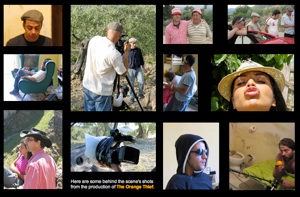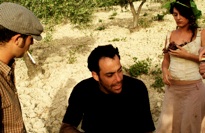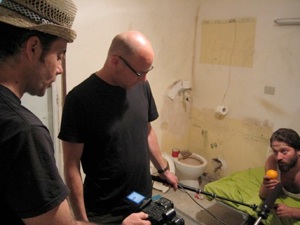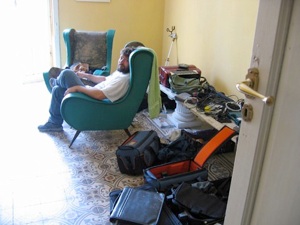


How to make an award-winning feature-film in just over 30 days.
Script, Shoot and Edit in 30 Days
Universally scorned, parasites get a bold and outrageous new look. As, perhaps, the best form of symbiosis.
We’ve all heard folks yakking endlessly about how they are gonna make a film, how they’re working on a script, yadda yadda. We wanted to do the opposite, make a film before anyone even realized we were trying.
Since no one would invest in such a cokkamammy idea we were doubly in trouble. There was no money either.
So the first and most outrageous decision was this. Scripts cost too much money. Sure we could write one for free, but it would still be too expensive. Each day we would have to have everything the script called for (i.e. a red hat, an old stove, a church, a school, school kids). All the seemingly simple things a script includes and insists upone (for example, healthy actors), cost time and money. Worse still, the available actors may not be ideally suited to the rolls in the script (a big problem, how often have you seen your favorite actors stinking up the screen in a roll that just doesn’t work fro them? Answer: LOTS AND LOTS).
Secondly, we decided to shoot almost the entire film outdoors. Why, well lighting is much easier. The cheap cameras we could afford sucked up sunlight like honey, but once inside, even our best lighting attempts were sketchy. Fortunately for us, Sicily doesn’t have sporadic rainfall. In fact, it hardly ever rains (lets forget that while we were there it broke records).
Third, what can be better than an outrageous deadline. Scriptwriters wake up, go to the coffeeshop and tell themselves that by new years they will have finished their opus.
Fourth, people don’t read scenes well. We don’t understand people’s vision. So instead of listening to vinnie or artie tell me about what they wanted to shoot, i’d say, “go shoot it” by that afternoon, we were no longer waving our hands, we were watching.

Greatness
in Forty Sicilian
Days


The directors had a dream: shoot a film in a language they don’t speak. 13 people all sleeping in two rooms. The actors in the jail scenes were required to build the jail. The actors running in the orange fields were required to load all the camera gear and collect oranges. All actors had to design and make their costumes. Of course there was help. Everyone helped with everything. Art Wilinski, a Hollywood Prop master, was one of the three directors. Never having spent time in Italy before, he was driving around Sicily with an Italian dictionary looking for 1960’s turntables was not an easy task. Especially since most Sicilians don’t speak Italian. Jean Marc, the French tourist cooked most of the meals for the crew. When he couldn’t, Micaela was there to cook. Scripted and shot in two months in Italy. Orange season inspired them. They jumped on the possibility to use the new technology of HDV cameras.
Black Boot Beach is a group of lazy and poor wannabes. Or perhaps a group of visionaries, time will tell. But we are convinced that the way films are made has a lot to do with why they SUCK! When we watch a film we don't fall in love with script and story first, we fall in love with personality, vision, imagery and collections of pretty moments. Sure a story is important, but what if other things, which are difficult to achieve are even more important. Can you tell me how Snatch ends? What was the story? I can't. But I loved it. The same is true of Star Wars I, Resevoir Dogs and a hundred of other great films.
It is this paradox that drives us. Start with personalities. Start with moments and build from there. Though improv is almost always lame (and something we hope to never do) a fixed script is even more stifling. Too much logic, perhaps, or just not enough vision. Therefore we have come up with a new way to do things. It involves relying on accidents. Searching for moments, mistakes, laughter, whatever. We film for a month without any idea of story. We shoot dozens to hundreds of unrelated scenes with cheap cameras (example below). We throw away the real shit. But from there, we take the best moments and personalites of those scenes and write them together in a story. We write the scripts, we shoot from a script, but it is a script made by happenstance and laughter. Based on what our actors do well. And how long does it take to write, well the orange thief took a night. And the Son of Tango Kid, took a week and a half. Not bad.
Director’s Notes:
The Orange Thief
A foreign film directed by 3 Americans
Filmed in Lucca-Sicula, Sicily
May 2007
The Orange Thief is a unique film for a variety of reasons:
•It is the directorial debut of 3 Americans:
Boogie Dean (James D’Angelo), Vinnie Angel, and Artie Wilinski.
•This film did not begin with a script, only plot concepts and character sketches that the three directors divided up, scripted and shot separately.
•Each director had a SONY HDV camera and shot his scenes completely independent of the other two directors. Only after a scene was scripted, cast, shot and roughly edited was it presented to the other directors for comment and criticism. If it was agreed that the scene was successful the other two directors would incorporate the new character developments, new props, new locations, or new secondary characters into their follow-up shoots.
•The film is in Italian and Sicilian and shot entirely in Lucca-Sicula, Sicily.
•The film features performances by a cast of Sicilian and Italian non-actors: Andrea Calabrese, Wild Boar Giottoli, Miceala Saxer, and Innocezo Di Lisi (as the guard).
•The entire film—from story concept to final take—was accomplished in one month and for less than $15,000.
•The entire crew of 11— five Americans, six Italians and one Frenchman (including the three directors) slept in two rooms and took turns cooking the pasta and holding the boom.
The Orange Thief is a uniquely independent film, having been created from scratch in one month--in a foreign language, with Italian and Sicilian non-actors, by first time directors.
Our initial goal was to combine 11 dynamic individuals in a remote location (the mountains of Sicily) for two months--none with acting or directing experience, and create a complete feature film, from scratch--story concept to final take.
We set out for Sicily with the expectation that everyone who showed up would have an equal opportunity to be a director or an actor. Our group was half Italian and half American with one Frenchman tossed in for good measure (and good cooking!). All 11 slept in two adjacent rooms, took turns cooking—and in the first month, we took turns directing and acting as we taught ourselves how to use the cameras and how to shoot scenes. In the second month, we created our story concept and divided up into actors and directors, based on what each person felt their strength was in our first month of test shooting.
THE ORANGE THIEF did not begin with a script, only plot concepts and character sketches that the directors divided up, scripted and shot separately--sort of an "exquisite corpse" method of filmmaking. Each director had a SONY HDV camera and shot his scenes completely independent of the other directors. Only after a scene was scripted, cast, shot and roughly edited was it presented to the other directors for comment and criticism. If it was agreed that the scene was successful the other two directors would incorporate the new character developments, new props, new locations, or new secondary characters into their follow-up shoots.
THE ORANGE THIEF was filmed entirely in Lucca-Sicula, the mountain town that is also the hometown of Boogie and Vinnie's paternal grandparents. The same town that their grandfather fled as a teen to come to NYC to attempt to become a movie star.
The entire production cost less than $15,000.
Did we mention that many of the scenes were shot with no crew? Just a director, two actors, a thousand flies, and the boom on a tripod.









